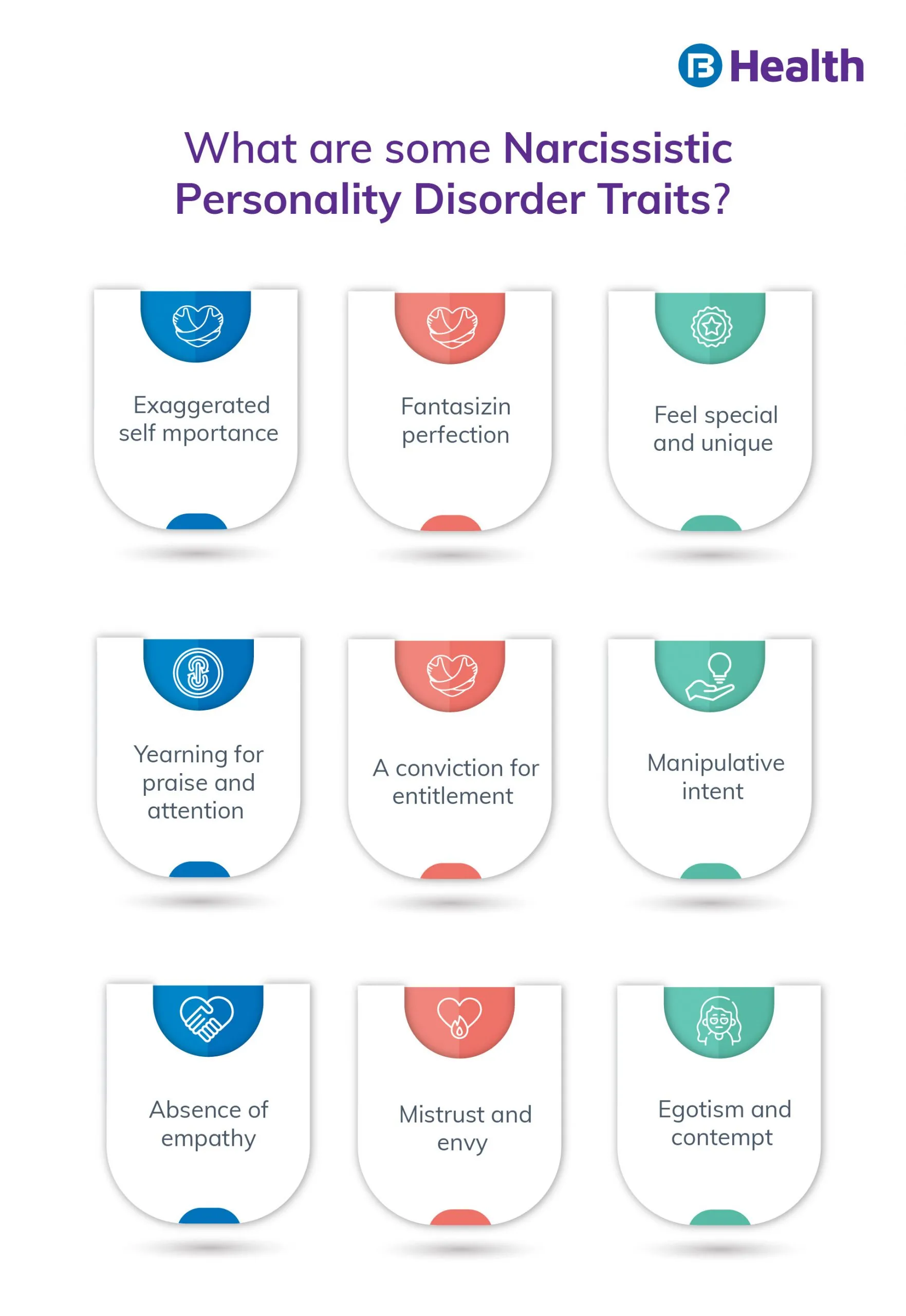Psychiatrist | 7 min read
Narcissistic Personality Disorder: Types, Symptoms & Causes
Medically reviewed by
Table of Content
Synopsis
Narcissistic personality disorder (NPD) is a mental condition where the affected exhibit behaviors such as selfishness and obsessive egotism with disdain towards others regardless of relationships. The article discusses personality disorder’s symptoms, causes, and management.
Key Takeaways
- Narcissistic personality disorder (NPD) is a mental condition and not a personal choice of behaviors
- Symptoms of NPD include craving for attention, belief in entitlement and superiority and lack of empathy
- The symptoms directly affect how the person with a narcissistic personality connects with others and projects themselves
Narcissistic Personality Disorder (NPD) is a mental condition where an individual cannot handle the slightest criticism due to an inflated sense of superiority. These people need constant external praise and attention and are generally unhappy and disappointed when they feel deprived of the admiration they deserve. The result is self-centered individuals lacking empathy regardless of relationships. Here is a detailed discussion to help spot narcissists and how to deal with their traits.
What is Narcissistic Personality Disorder (NPD)?
Narcissistic Personality Disorder is a medical condition where the narcissist lives in a make-believe world of self-importance. The disorder causes multiple problems in life, including relationships, social interactions, and financial affairs resulting in a deep sense of insecurity.
The fragile mental state often results in troubled relationships, and narcissists fail to endear others to their lack of empathy. However, narcissistic traits occasionally surface in our thoughts and behavior but are not a generalized attitude toward everyone.
Symptoms people with Narcissistic Personality Disorder commonly show:
- Displaying high self-esteem
- Exuding social confidence
- Assertive and competitive
- Expressing pride in accomplishments
- Obsessed with physical appearance
- Disliking others
Types of Personality Disorders
There are ten personality disorders, and NPD is one of them. [1] Any two of the following criteria confirm a personality disorder diagnosis:
- Traits that make relating and connecting with others or themselves difficult – how they respond emotionally to others and control their behavior
- Pathological characteristics that surface across different situations
Since personality disorders do not show uniform symptoms or pathological traits, the classification places them in groups based on representative personality traits.
- Cluster A: Odd and eccentric
- Cluster B: Dramatic and erratic
- Cluster C: Fearful and anxious

Based on the above classification, Narcissistic Personality Disorder belongs to cluster B with the following characteristic behavioral traits.
- Dramatic and exaggerated
- Emotional and intense
- Erratic and unpredictable
Symptoms of Narcissistic Personality Disorder
All individuals display narcissistic traits at some point in life. However, they are not of the same severity, frequency, and duration of NPD.
Most mental health professionals consult the American Psychiatric Association’s Diagnostic and Statistical Manual of Mental Disorders (DSM-5) to diagnose NPD accurately. [2] Accordingly, confirmatory diagnosis depends on the presence of five specific narcissistic personality disorder symptoms, though not necessarily in the same severity or frequency over time and in different situations.
Exaggerated Self-Importance
Persons with NPD have a false sense of self-importance and power. They seem intelligent and charming and tend to lie about their achievements to reaffirm their superiority.
Fantasizing Perfection
People with narcissistic behavior are prone to fantasize about their perfection. They believe in having more power, beauty, and intelligence than others.
Feel Special and Unique
Persons with NPD constantly highlight how special and unique they are than others. Unfortunately, this leads them to believe that they belong to groups of exceptional people while others are not as smart or unique.
Yearning for Praise and Attention
A person with a narcissistic personality has an insatiable need for praise and attention. Moreover, they resent a lack of appreciation and criticism.
A Conviction For Entitlement
A person with a narcissistic personality believes that particular treatment and privilege are their rights. As such, the person demands everyone around to comply with their expectations.
Manipulative Intent
Persons with NPD justify considering manipulation and exploitation to achieve their goals as personal gain takes precedence over everything else. So, they can resort to cruelty to fulfill their aims.
Absence of Empathy
Lack of empathy towards others is familiar to people showing narcissistic behavior. So, they show selfishness and a lack of compassion.
Mistrust and Envy
People with NPD cannot tolerate competition and envy the accomplishments of their perceived rivals, even when there aren’t any.
Egotism and Contempt
It is usual for people with NPD to be arrogant and consider others worthless.
Causes of Narcissistic Personality Disorder
Since narcissistic Personality Disorder is one of the least researched disorders, its causes and contributing factors have not been entirely identified yet. This makes it a difficult disorder to treat due to a lack of insight. However, most researchers believe two or three significant causes trigger narcissistic personality disorder symptoms:
- Environment and cultural influences
- Parent-child bond and early life experiences
- Heredity
Thus, the development is due to the response to specific life experiences and situations like:
- Experiencing a traumatic event
- Neglect and abandonment
- Disproportionate criticism from the loved ones
- Experiencing abuse and discrimination
- Excessive underserved praise and pampering
- A family history of NPD
These conditions are indicative, and responses to specific situations vary, which makes determining the exact cause difficult. Moreover, although the reactions are selfish, they may not classify as a narcissistic personality disorder.

Narcissistic Personality Disorder Diagnosis
Narcissistic Personality Disorder diagnosis is in the hands of medical health professionals as narcissism goes far beyond behaviors and attitudes. But before that, gaining insight into the NPD subtypes is essential. Most experts opine about two NPD subtypes:
Overt Narcissism:
It is grandiose narcissism showing the following traits.
- Arrogant
- Pretentious
- Dominant
- Exhibitionist
- Aggressive
- Self-assured
Covert Narcissism:
The typical characteristics of the disorder are:
- Anxious
- Sensitive to criticism
- Insecure
- Defensive
- Withdrawn
A psychiatrist or a psychologist is the right person to diagnose NPD after gaining access to the person’s medical history. So, when to get doctor consultation is crucial as persons with NPD seldom venture to seek help or attend therapy sessions. Yet, the professional diagnoses NPD using the DSM-5 model by measuring the following:
- Personality traits of the individual
- How the person relates to the world – relationships, occupation, etc.
- Sense of identity
- Patterns of change relating to self-image and esteem over time
- If the person is capable of empathy
If the outcomes of all these measurements support five or more symptoms already discussed, the diagnosis paves the way for therapy. However, there are conflicting opinions about Narcissistic Personality Disorder diagnosis focusing on interpersonal behaviors.
Narcissistic Personality Disorder Treatment
Persons with NPD don’t often seek help to treat the mental health condition but for other challenges until the disorder impacts their life significantly. Common mental disorders to develop alongside NPD are:
- Anxiety
- Depression
- Substance Abuse
More often than not, people with NPD seek professional help for these rather than the personality disorder. While the above needs medications to manage, there is no provision for treating narcissistic personality. So, therapy can help the person develop skills and strategies to relate with others and themselves. Psychotherapy is the most common treatment for NPD, which is proven to be effective in the long term. The other is lifestyle changes. So, let us look at how they help.
Psychotherapy
- Improved collaboration with peers at the workplace
- Sustain personal relationships
- Come to grips with self-potential and learn to tolerate criticism and understand others’ perspectives
- Realize the significance of feelings and control emotions
- Cope rationally with self-esteem issues and set realistic goals
Since personality traits are difficult to change, psychotherapy may need years to show results. It is only with time that the difference is noticeable. Moreover, these goals are specific to individuals and vary according to the needs and the psychotherapist’s approach.
Lifestyle Changes
- Avoid substances likely to trigger problematic responses
- Identify and religiously follow healthy practices
- Engage in yoga and meditation sessions to relax and release stress factors
Prevention
People with NPD abandon therapy sessions midway, considering it a waste of time because it may take years to show results. Contrarily, early preventive measures can be as effective.
- Seek professional help as early as possible when the NPD symptoms appear
- Develop communication skills through family therapy sessions and cope with emotional distress
- Keep in touch with social workers and seek guidance from therapists
People with narcissistic personality disorder are unable to understand and share the feelings of another, making it hard for them to connect intimately. Early diagnosis and treatment, along with psychotherapy, can help individuals suffering from NPD adjust to society and maintain relationships. Get a doctor consultation today with Bajaj Finserv Health and learn more about the remedies for Narcissistic Personality Disorder.
References
- https://mantracare.org/therapy/what-is/types-of-personality-disorders/
- https://archive.org/details/american-psychiatric-association-diagnostic-and-statistical-manual-of-mental-dis
Disclaimer
Please note that this article is solely meant for informational purposes and Bajaj Finserv Health Limited (“BFHL”) does not shoulder any responsibility of the views/advice/information expressed/given by the writer/reviewer/originator. This article should not be considered as a substitute for any medical advice, diagnosis or treatment. Always consult with your trusted physician/qualified healthcare professional to evaluate your medical condition. The above article has been reviewed by a qualified doctor and BFHL is not responsible for any damages for any information or services provided by any third party.





